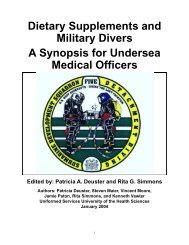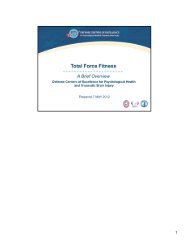Force Health Protection: Nutrition and Exercise Resource Manual
Force Health Protection: Nutrition and Exercise Resource Manual
Force Health Protection: Nutrition and Exercise Resource Manual
Create successful ePaper yourself
Turn your PDF publications into a flip-book with our unique Google optimized e-Paper software.
Worksheet 12-3. Calculate Your Energy<br />
Requirements at Altitude<br />
Your Estimated Energy Requirement (EER) =<br />
kcal/day<br />
(see Chapter 1)<br />
A 50% increase in energy requirements equals:<br />
EER x 0.50 =<br />
kcal/day<br />
Your total energy requirement equals:<br />
EER + 50% increase= kcal/day<br />
A high-CHO diet (60% of total daily kcals) is preferred at altitude because<br />
it restores glycogen, requires less oxygen to metabolize than a high-fat diet,<br />
<strong>and</strong> can blunt or delay the severity of AMS symptoms.<br />
Vitamin <strong>and</strong> Mineral Needs<br />
Vitamin <strong>and</strong> mineral needs are likely to increase at altitude. In<br />
particular, the increased metabolic rate <strong>and</strong> the lack of oxygen can increase<br />
the production of harmful free radicals. These free radicals can slow blood<br />
circulation <strong>and</strong> impair physical performance. Preliminary findings in men<br />
indicate that taking 400 IU per day of vitamin E, an antioxidant, at high<br />
altitude reduces free radical production <strong>and</strong> maintains aerobic energy<br />
production. Increased amounts of many other nutrients should be considered,<br />
especially since food intake usually decreases (see Table 12-2).<br />
Tips for Maintaining Performance at Altitudes<br />
◆ Plan on decreased physical performance the first few weeks.<br />
◆ Drink plenty of fluids. Fluid requirements may be as high as 4.25<br />
quarts, or more, each day.<br />
◆ Listen to your body, be aware of any warning signs of illness or<br />
symptoms of AMS <strong>and</strong> seek medical attention.<br />
◆ Try to avoid substances that cause dehydration (Table 12-1).<br />
As noted throughout this chapter, meeting energy <strong>and</strong> fluid requirements<br />
are vital for maintaining physical performance in adverse environmental<br />
conditions. Being physically fit <strong>and</strong> eating a healthy diet prior to deployment<br />
will greatly improve your acclimation <strong>and</strong> adaptation to the new<br />
environment.<br />
<strong>Nutrition</strong> <strong>and</strong> <strong>Exercise</strong> <strong>Resource</strong> <strong>Manual</strong> 99




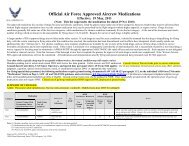
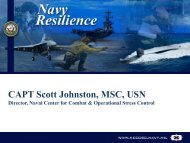
![Body Composition and Military [PDF] - Human Performance ...](https://img.yumpu.com/43269347/1/190x245/body-composition-and-military-pdf-human-performance-.jpg?quality=85)
![Tips for Grocery Shopping [PDF]](https://img.yumpu.com/37447379/1/190x245/tips-for-grocery-shopping-pdf.jpg?quality=85)
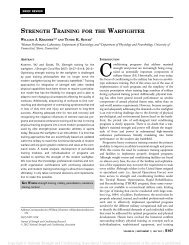
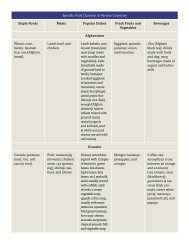
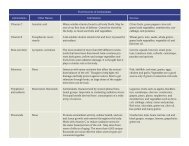
![Synthetic Drugs [PDF] - Human Performance Resource Center](https://img.yumpu.com/37447322/1/190x245/synthetic-drugs-pdf-human-performance-resource-center.jpg?quality=85)
